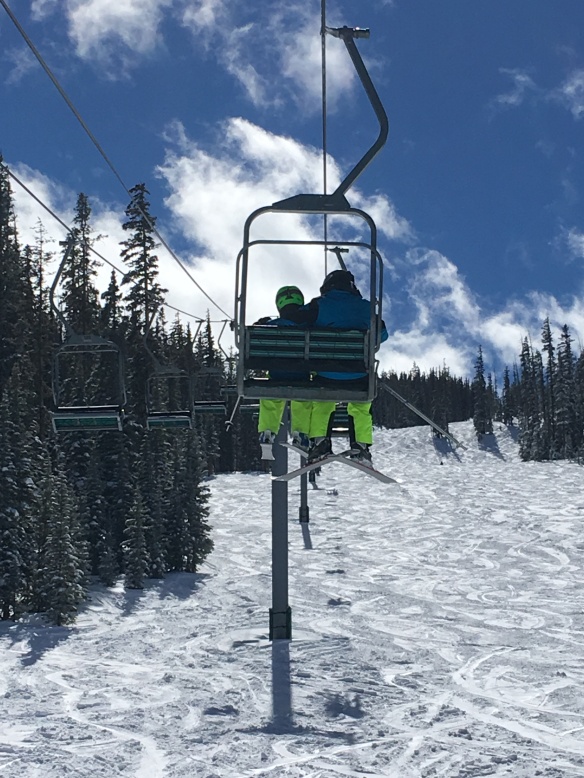We went skiing again, two weeks ago. I feel so incredibly fortunate to have had two separate ski weeks this year. This time it wasn’t Park City, but Beaver Creek. Adrian has skied Beaver Creek before; for me and Martin, this time was the first.
When we’re at Park City, Martin takes his lessons through the National Ability Center, which you know I love. The instructors are trained and experienced in giving adaptive lessons, they got Martin skiing for the first time, and I’ve seen them perform miracles when it comes to getting more severely affected children and teens sliding down the mountain.
At Beaver Creek, we booked a full week of half-day lessons through the in-house adaptive program. The Beaver Creek adaptive lessons were discounted from standard one-on-one lessons but still quite expensive.
When Martin was doing skating lessons in the hope—ahem, in my hope—that he could play hockey, his instructor was not trained in working with special-needs kids. He was patient, maybe too patient, and no expert at motivating Martin. This may be my own unnecessary fear, but at some point I was unsure whether the instructor even enjoyed working with Martin enough to push him. Martin may not have got as much from those skating lessons as he should have. I’ve had the same feeling about the music lessons—first his piano lessons and now his trombone lessons, both with “regular” instructors. Sometimes those who don’t work regularly with impaired children seem to have pretty low expectations of what they can accomplish.
So I was uneasy Monday morning when I discovered that Martin’s instructor, Steve—Martin was assigned the same guy for the whole week—was not a full-time adaptive instructor and instead taught mostly standard lessons. Steve had called me the night before, to go over the notes in Martin’s file, and asked questions about what to expect. Nevertheless, I feared he might not know how to handle Martin’s shortcomings like attention, coordination, or frustration tolerance. I worried whether he would value Martin’s strengths, like curiosity, and perseverance when motivated.
Those fears were relieved as soon as I retrieved Martin after Monday’s lesson. Martin was a bundle of enthusiasm as he whispered dramatically about the secret path they’d skied through trees and then demonstrated how they howled like wolves in the woods. Steve talked about Martin as if he were any kid: His parallel stance was improving and he wasn’t wedging to slow anymore, but his hockey stop wasn’t 100%, either. They’d crossed several hillsides to work on keeping skis together. When allowed to ski independently Martin was still straight-lining instead of turning. He’s eight, the instructor said. That’s what eight-year-olds do.
I have a long history of bristling when I hear “all kids do that.” On this occasion, it didn’t bother me. To the contrary, by Wednesday, after three lessons, I was convinced that Martin was improving faster with Steve than with any previous instructor, and if Steve was bothered by Martin’s shortcomings, he wasn’t dwelling on them. On Friday, during his final lesson, Martin skied his first black diamond.
The Steve situation, i.e., Martin doing better with a standard instructor than an adaptive instructor, engenders where we are now. Martin has improved again since our post-Christmas dip. At times he seems close to typical. And that raises a whole new crop of problems. Back when I couldn’t get Martin to respond to a question and trembled at the constant meltdowns, taking too long to get ready for taekwondo class would not have bothered me, at least not much. When he couldn’t hold a pencil, or when we still worried about cognitive impairment, I probably would have delighted that he was doing math homework, not fretted that he was dallying.
The expectations of Martin have become higher, and sometimes he rises to the occasion, as he did with Steve. On the other hand, I find more reasons to be frustrated when these expectations aren’t met. Which, when you think about it, is unreasonable indeed.
Here we sit, neither typical nor impaired enough to—to make a big deal out of it? I’m friendly with a taekwondo mother whose son has attention issues. Her son’s issues are slight, and always have been. She’s so skilled at rolling with the punches: accounting for her son’s tardiness, giving him “good attention” reminders, supporting him socially, monitoring his after-school activities to make sure they are meeting his needs. I’m not so good at all that, yet. I’ve spent so many years putting Martin’s shoes on for him and helping him eat that I haven’t developed the skill set to empower his independence.
Time to raise other expectations. Of me.

Adrian and Martin, heading up the mountain.

Martin, enjoying a fountain view, after a long day of skiing.
